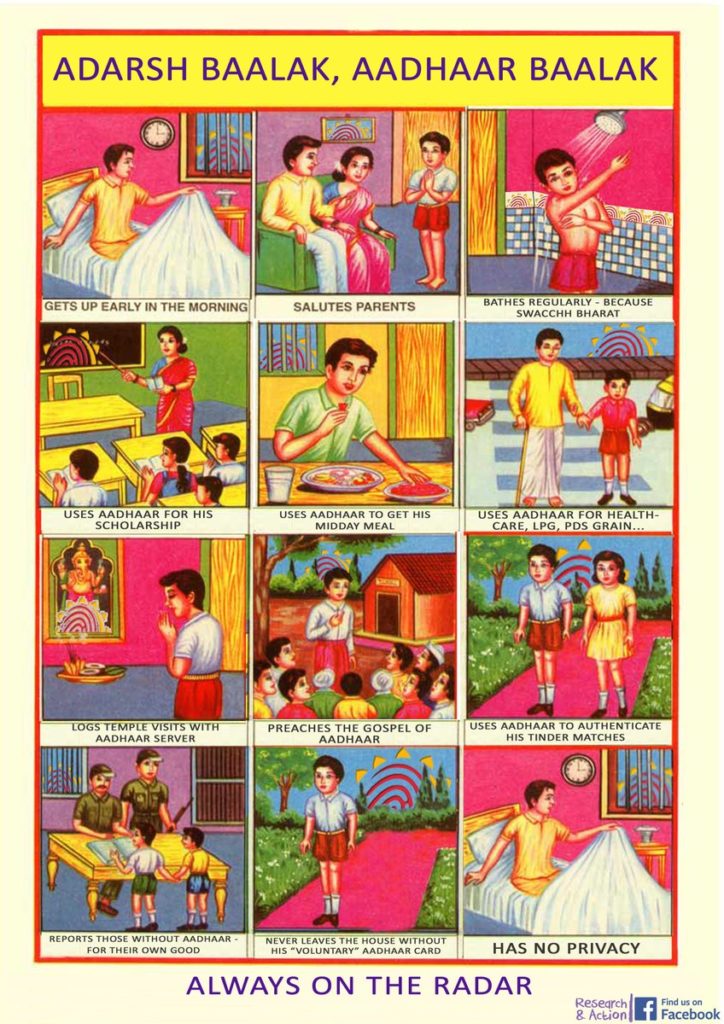Aadhaar & Your Child: Reasons to Be Concerned

Some volunteered for Aadhaar, while the rest are having it thrust upon them. The debate over the Aadhaar card and the bio-metric database and its security design, relevance etc is currently attaining critical mass. And it has not been easy to keep up with the news and machinations around it.
What is clear is that it has implications for everyone. And for the more vulnerable individuals and communities in the country, including our children, all the more so.
Here is what you need to know:
What is Aadhaar?
Aadhaar is a 12 digit unique-identity number issued to all Indian residents. It is based on their biometric (fingerprint & retina scans) and demographic (race, income, education, employment etc) data.
Is it compulsory to have an Aadhaar Card?
This is the starting point of most debates on the Aadhaar card.
While the Supreme Court has declared the card voluntary, the Aadhaar Act 2016 seeks to make it compulsory for citizens to have an Aadhaar card to access several welfare (mid-day meals, rehabilitation of trafficking victims, MNREGA, primary school education etc) and non-welfare schemes (pan card, income tax returns etc). The tug-of-war between the judiciary and the state has been ongoing for years now.
Last heard, the Court maintained that the state can declare the Aadhaar compulsory for non-welfare schemes but not for the welfare ones. However, the state moves ahead unfazed in implementing compulsory Aadhaar across the board.
Here is the list of government schemes (till now) where Aadhaar has been made compulsory. The list includes various Integrated Child Development programs including Anganwadi Services, ICDS training, ICDS Scheme for Adolescent Girls, Integrated Child Protection Scheme, scholarships opportunities and e-panchayat, Sarva Shiksha Abhiyan Scheme for children with disabilities and Mid Day Meal Scheme.
At this point, how this will pan out is anyone’s guess. Currently, the mood is one of uncertainty.
It raises a lot of questions though. How much information is collected and where will it stop? Where is everything stored and how safe it is? Who is authorized to use the information and how? What happens when there is a data compromise? Who is responsible in that case?
What are the implications of Aadhaar on Children?
1. Natural Biometric Changes in Children: Until the age of 15 or 16, the biometrics of a child may keep changing as they grow and develop. Therefore hinging access to an essential service like mid-day meals to it is a dicey proposition at best. What if the child’s current fingerprints and the fingerprints captured as part of the Aadhaar differ? Would it mean that the child would not be eligible and would have to go hungry until the confusion is sorted? How will the grievance of the child be addressed in a way that is quick and efficient?
2. Notification For Updation of Biometrics: Among the circumstances listed under which the Aadhaar card may be suspended is the following:- “If a child at 5 or 15 years of age fails to update biometrics afresh within two years of attaining age.” So if the Aadhaar is made compulsory to access essential services, suspension of the Aadhaar card (unlike say a passport or drivers license, in which the implications may be considerably less) will be absolutely detrimental to a child’s well-being and development. In such a precarious scenario, what are the measures by which government will intimate the parents/guardian etc that the renewal of biometrics is due?
3. Privacy of the Children: Another point mentioned in the debate against is that before meaningful consent can be sought, children are being forced to hand-over their identification and biometric data to the state. This pushes them into the realm of life-long surveillance.
Our jails and juvenile homes are full of children and young adults from the marginalized sections of society. In such a scenario, what are the safeguards to ensure that the Aadhaar identification will not be used by the state to breach the privacy of its more vulnerable citizens, or students who don’t agree with the government? There are no existing laws around privacy in the country which governs and makes such intrusive activity, an accountable one.
4. Frequent & Easy Breach of Data: Lastly, there is a lack of accountability regarding the safety and security of this precious data. Just recently, personal details of over lakhs of children were publicly listed on a website. Another public Aadhaar database was found via a simple Google search. Despite reassurances by the government, the Aadhaar database has seen a spate of leaks. Do we really want to handover our children’s most private details to such a breach-prone system?
5. Already Behind the Times: In an age of high resolution cameras, it is easy for anyone to steal an accurate impression of your finger-prints and irises with a simple click. Are biometrics even sustainable as a foolproof form of identification anymore? Or did it get phased out even as the debate was underway?
There is no doubt that the country could use a convergence mechanism that reduces the undue burden of paperwork and bureaucracy. But it needs to be implemented in a manner that is consistent with our fundamental rights.
It should not become yet another tool that creates exclusion, anxiety and puts our children at risk.
The Leaks:
Government admits Aadhaar can be hacked
The Paradoxes:
In Basti, Gautam Budh Nagar and Ghazipur districts, Aadhaar enrolment numbers have been issued to a cow, a puppy and “Mantu Dog”. #DidYouKnow Lord Hanuman and Lord Ganesha too have an Aadhaar card?
Read More:
Eleven reasons why the Aadhaar is not just non-smart but also insecure
Without Supreme Court Interference, the Aadhaar Project is a Ticking Time Bomb
Aadhaar is a legal right, but your number can be suspended without prior notice







